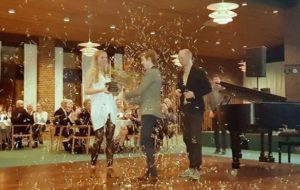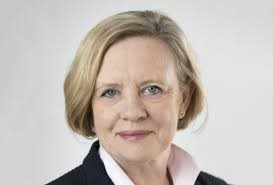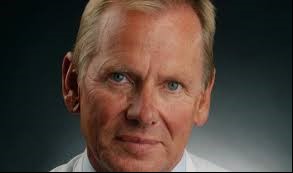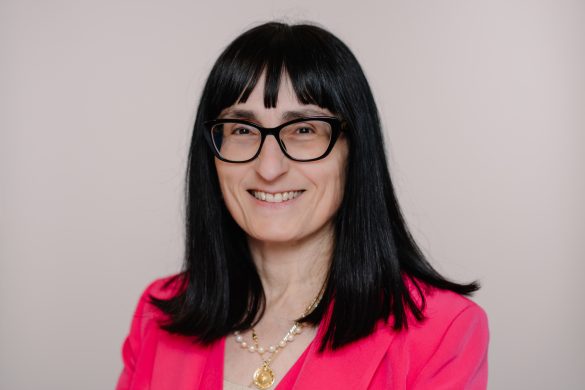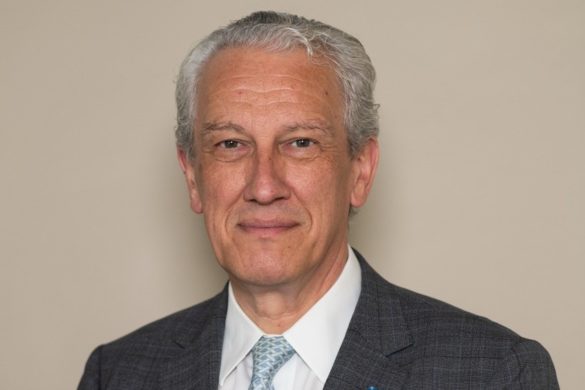by Prof. Gunhild Waldemar, Dr Asger Guld and Dr Jesper Erdal
Denmark is placed in Northern Europe and is one of the three Scandinavian countries. The population is 5.7 million and Copenhagen, the capital of Denmark, is by far the largest city with a population of 1.3 million. Denmark has a total area of 42.924 km2 (16.573 sq mi).
Wonderful Copenhagen
Copenhagen is a truly charming city with a distinct Nordic, cool. It is famous for its many old buildings mixed with modern prize-winning architecture, museums, New Nordic Cuisine, and green environment with numerous bicycles.
Copenhagen is known as a clean, green, and safe city that has been ranked amongst the most livable cities and Denmark amongst the happiest countries in the world. Copenhagen has just been ranked No. 1. as the best city to travel to in 2019 by Lonely Planet.
The political system
The political system in Denmark is framed by a parliamentary representative democracy, a decentralized unitary state and a constitutional monarchy with Queen Margrethe 2 as head of state. But in fact, the monarch has a very limited role in the government of Denmark (a separation of powers has been effective since 1901, when the parliamentary sovereignty was introduced). The political system has a multi-party structure where several parties are represented in Parliament (featured in the television series “Borgen”!).
The welfare system is tax-funded and secures free and equal rights to education and healthcare. Other benefits are also secured through the system such as parents rights to a maternity leave of 52 weeks with allowances and other social benefits. Taxes are high in Denmark, but the idea is that everyone must contribute to society and in return society will help taking care and providing benefits for all in need.
The health system in Denmark
The healthcare system is based on the principles of equal and free access to healthcare for all citizens
and it offers high-quality services which are almost entirely financed by taxes.
Five regions are responsible for hospital care, emergency care, psychiatry and health services provided by GPs and private practice. 98 municipalities are responsible for different health and social services like local health and elderly care, rehabilitation outside
hospitals, home nursing, child nursing etc
How to become a neurologist
Denmark has four universities that educates medical doctors. Education is, as mentioned free of charge, and students furthermore receive funding from the state, that pays part of living expenses.
It takes six years to complete the university studies. To become a neurologist, you must go through a five-year specialist training position, which includes national courses, six months of clinical training in neurophysiology, three months of neurosurgery and three months of clinical psychiatry training and four years of clinical neurological training at three different departments. There is no board examination, but well described skills must be evaluated by mentors at the training departments.

Neurologist at the Danish Neurological Societies Annual Meeting
Clinical neurology
In Denmark there are 13 neurological departments, five departments of clinical neurophysiology and approx. 50 neurologists in private practices. In collaboration with the national health authorities the rare and complicated neurological diseases are centralized at the university departments in the three biggest cities: Copenhagen, Aarhus and Odense.
There is one neurologist for every 16.000 inhabitants
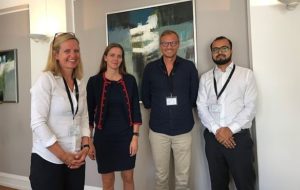
Representatives of the Danish Neurological Societies at a meeting with the Danish Minister of Health Ellen Trane Nørby (second for the left)
The Danish Neurological Society
The Danish Neurological Society (DNS) was founded in 1900 and is one of the world’s oldest neurological societies. DNS is an active society with more than 700 members, and we arrange several national scientific meetings every year. In 2016 DNS proudly co-hosted the 2nd Congress of EAN in Copenhagen.
Young neurologist
The Danish association of Young Neurologists, Neurosurgeons and Neurophysiologists (YNNN) was founded in the 1970s and has since then grown into a nation-wide organization with about 400 members. Medical doctors atthe beginning of their career constitute the organization. Members are united by the desire to achieve optimum education and improve clinical skills. YNNN works towards this goal in different committees and by arranging educational meetings. The work within YNNN is entirely voluntary.
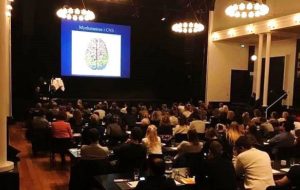
The Annual Meeting of the Young Neurologists attracts more than a hundred members from all over the country
The biggest YNNN event of the year is a two-day joint meeting in January that gathers more than a hundred members from the entire nation. Meetings cover primarily clinical aspects, but also the frontiers of research, ethical and educational aspects. Experienced national and international speakers, often senior consultants and professors are invited to give lectures or case-based presentations. Each year an overall topic is chosen, e.g. “Update on Stroke”, “Diseases of Medulla and Radices” or the upcoming “Disorders of Consciousness”. Other activities include the annual awarding of the much coveted “Teacher of the Year”-prize, recruitment to the specialties and keeping members up to date on upcoming events and courses.
Academic neurology
Danish neurology covers all fields of neurology, several areas on a high academic level. We have strong academic groups within dementia, headache, MS, sleep medicine, stroke, pain, neuromuscular diseases, movement disorders, epilepsy, clinical neurophysiology and neuro-rehabilitation.
Denmark is home to The Lundbeck Foundation Brain Prize, the most prestigious prize in neuroscience.
Danish neurologist in international neurology
Danish neurologists have contributed with leading organizational roles to the advancement of international neurology. Amongst others, Professor Jes Olesen has served as President of the International Headache Society, President of the EFNS, co-founder and President of the European Brain Council; Professor Gunhild Waldemar played an important role as a member of the transition task force in the successful merging of the two European neurological societies ENS and EFNS into EAN; and Professor Per Soelberg Sørensen has held numerous international organizational posts within MS and served as Executive Board member of EAN.
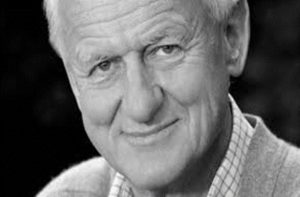
Professor Jes Olesen
The future
The future is promising: Neurology has become more attractive to young doctors due to an active policy of the DNS, the departments of neurology, and the Danish Association of Young Neurologists which has grown into a big active society, where young neurologists joint together in their interest in neurology. The next generation is ready to pick up the baton.
Prof. Gunhild Waldemar is Acting Chair of the Neurology Department at Rigshospitalet, University of Copenhagen as well as Chair of the Danish Dementia Research Centre and the Copenhagen Memory Clinic. She is a Board member of the Alliance for Biomedical Research in Europe and was awarded the “The Monrad – Krohn Prize” award for research in neurology and the “The Nordic Medicine Prize”.
Dr Asger Guld is Neurologist at Rigshospitalet, University of Copenhagen
Dr Jesper Erdal is head of the Department of Neurology at Herlev Hospital

